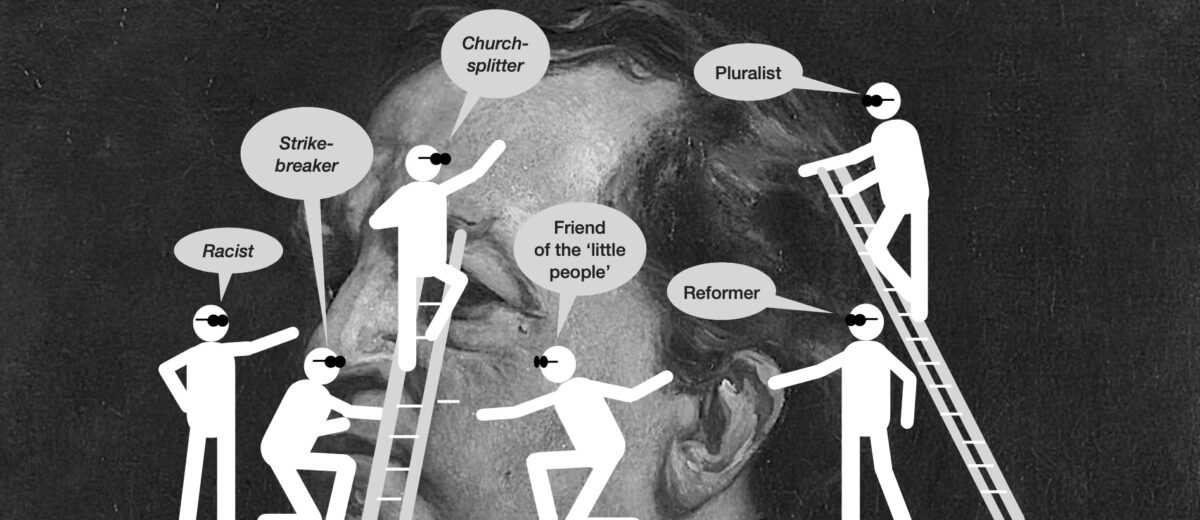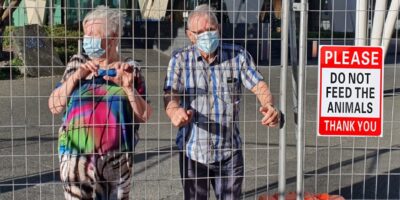Time for one last Kuyper analysis before the centennial year of 2020 expires.
None-too-early, a centenary Kuyper-magazine has just appeared in the Dutch shops, edited by Kuyper-specialist George Harink of the Free University. Reading the various articles in this BRAM-publication (Kuyper’s familiar name, short for Abraham), featuring well-known Dutch politicans, academics and public figures, reminded me of the story of the blind men and the elephant, each with their own impressions and conclusions but missing the bigger picture.
For some still blamed Kuyper for splitting the Dutch Reformed Church (NHK) back in 1886, causing the so-called Doleantie (mourning) movement resulting in the Gereformeerde Kerken, literally the Re-reformed churches of the Netherlands, independent, democratically-governed congregations. What began as an attempt to reform the national church from the influence of modernism and rescue it from the stultifying traditions of aristocracy ended in Kuyper and 80 fellow ministers and church elders being expelled from the NHK and banned from using the church buildings. While the two streams have recently reunited along with the Lutheran Church to form the Protestant Church of the Netherlands (PKN), Kuyper remains the chief culprit for some.
Others saw in Kuyper’s racist views and his ‘sphere sovereignty’ teaching the roots of apartheid. In a passage from his Stone Lectures that shocks the modern reader, and reveals Kuyper as a child of his age, he spoke of one much preferring to be a member of the Arian race than for example a Hottentot or a Kaffir (this last then-innocent word now being as offensive as ‘nigger’, especially in South Africa). Yet while the idea of sphere sovereignty was used by some who claimed Kuyper’s legacy, Kuyper himself never saw race as a sphere – it was differing worldviews, not ethnicity, within which society should develop lifestyles and institutions. His complementary concept was ‘sphere universality’ by which all the various worldview expressions should work together for the commmon good of the whole, rather than in isolated ‘pillars’ or ‘bubbles’.
‘Unfathomable’
Yet others begrudged Kuyper his stifling of the railway workers’ strike while he was prime minister, in apparent contradiction of his championing the ‘kleine luyden’, little people. A socialist cartoon of the episode shows Kuyper throttling and pushing down a railway worker, an image that remains vivid among those ready to accuse Kuyper of hypocrisy.
The article by Johan Snel, author of the recent biography, De zeven levens of Abraham Kuyper, and whom I interviewed recently (Dutch only), reveals Kuyper as ‘unfathomable’, complex and a virtually inexhaustible source of new insights. He believes too many of his compatriots settle for a caricature of the man, without bothering to press on to realise what this giant of the past can still teach us.
It was an interview with a non-Dutch Kuyper expert, Afro-American Wheaton College professor Vincent Bacote, which resonated the most with me. He described his discovery of Kuyper’s theology of culture and public engagement, while a masters student, as ‘like breathing some much needed oxygen’. Despite his racist tendency, for Bacote Kuyper addressed the troubling lack of theological argumentation for Christian public engagement. Kuyper’s account of the Spirit’s work in creation prompted responsible engagement in all spheres of the world, from politics to culture to environmental ethics. He taught a life-system that not only encrouaged but even demanded public engagement. Bacote went on to write a book on appropriating the legacy of Kuyper, The Spirit in public theology.
Beach
Bacote’s discovery reminded me of the first time I heard about Kuyper, 48 years ago, from a doctor friend as we lay on a beach in the north of New Zealand, after hearing about my struggle to relate my studies to my faith, and to understand how God has been at work in human affairs. That beach discussion began a life-long journey of discovery with Kuyper as mentor which I talked about in a recent Look Up interview. Today we even live in the same street as did Kuyper for twenty years.
As you read this weekly word, Romkje and I have just arrived back in New Zealand–where this journey began–on a family visit, particularly to be with my almost- 98-year-old mother. While here I will work on a dissertation project researching evangelical views on the European Union, and their sources. Once more, Kuyper will be a guide and mentor, as the father of public theology and Christian worldview thinking.
Next week I will share our experiences of the first of two weeks in quarantine, before taking a break during January.
Till next week,




I have enjoyed your pieces on the contributions of Kuyper. It is sad that theologians are often so branded for a weak point or misunderstanding in something they expressed that their great contributions are overlooked and even rejected by some. I think it is when we recognize the weaknesses along with the contributions that we are best able to embrace what is good and set aside that which is in question. If we cannot do that we have probably only just begun our own theological journey of discovery.